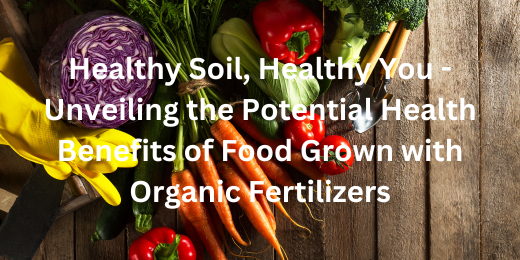
Healthy Soil, Healthy You – Unveiling the Potential Health Benefits of Food Grown with Organic Fertilizers
Organic fertilizer benefits
Understanding Organic Fertilizers
Organic fertilizer benefits encompass a range of advantages for both crops and the environment. By nourishing plants with natural nutrients, organic fertilizers promote soil fertility and microbial activity, resulting in healthier crops with increased resilience to pests and diseases. Additionally, these fertilizers improve soil structure and water retention, supporting sustainable agriculture practices.
The connection between health benefits of organic food and the use of organic fertilizers is undeniable. By enriching the soil with organic matter and essential nutrients, organic fertilizers facilitate the growth of nutrient-rich crops. These crops, in turn, offer consumers a bounty of vitamins, minerals, and antioxidants, contributing to improved health and well-being.
Furthermore, opting for organic fertilizers aligns with the principles of organic farming, which prioritize environmental stewardship and sustainability. Unlike synthetic fertilizers, organic alternatives promote biodiversity, reduce chemical runoff, and mitigate soil erosion. Embracing organic fertilizers not only enhances crop quality but also fosters a healthier ecosystem for future generations.
Healthier Soil, Healthier Food
Organic fertilizer benefits are rooted in their ability to enrich the soil naturally. These fertilizers introduce essential nutrients and organic matter to the soil, fostering a balanced ecosystem that supports plant growth. By nourishing the soil microbiome, organic fertilizers promote healthier soil structure and vitality, laying the foundation for sustainable agriculture practices.
Health benefits of organic food begin with the soil. When crops are grown in nutrient-rich soil, they absorb a wide array of vitamins, minerals, and beneficial compounds. Organic fertilizers contribute to this nutrient uptake process, resulting in crops that are more flavourful, nutritious, and resistant to pests and diseases. As a result, consumers enjoy food that not only tastes better but also supports their overall health and well-being.
Moreover, the use of organic fertilizers aligns with the principles of environmental stewardship. By promoting soil health and biodiversity, organic fertilizers help mitigate the negative impacts of conventional farming practices, such as soil degradation and chemical runoff. Embracing organic fertilizers is not just about growing food; it’s about cultivating a healthier planet for current and future generations.

Nutritional Benefits of Organic Produce
Organic fertilizer benefits translate directly into the nutritional quality of organic food. By nourishing the soil with natural amendments, organic farmers create an environment where crops can thrive and absorb a greater diversity of nutrients. As a result, organically grown fruits and vegetables boast higher levels of essential vitamins, minerals, and antioxidants compared to their conventionally grown counterparts.
Health benefits of organic food are evident in the superior nutrient profiles of organic produce. Studies have shown that organic fruits and vegetables contain increased levels of key nutrients such as vitamin C, vitamin E, and essential minerals like potassium and magnesium. These nutrients are vital for supporting immune function, promoting cardiovascular health, and reducing the risk of chronic diseases.
Organically grown produce often exhibits enhanced flavour and taste due to the balanced soil ecosystem fostered by organic farming practices. By prioritising soil health and biodiversity, organic farmers cultivate crops that are not only nutritious but also delicious, providing consumers with a truly satisfying culinary experience.
Environmental Impact
Organic fertilizer benefits extend beyond improving soil health; they also play a crucial role in environmental conservation. Unlike chemical fertilizers, organic amendments pose minimal risk of contaminating water bodies with harmful pollutants, reducing the environmental impact of agriculture and safeguarding aquatic ecosystems.
Moreover, the health benefits of organic food are closely intertwined with environmental sustainability. Organic farming practices prioritize biodiversity and ecosystem balance, promoting the preservation of natural habitats and wildlife. By eschewing synthetic chemicals and fostering healthy soil ecosystems, organic agriculture contributes to the conservation of precious biodiversity resources.
Furthermore, organic farming’s emphasis on soil health and biodiversity aids in mitigating climate change. Organic soils have higher levels of carbon sequestration, helping to mitigate greenhouse gas emissions and combat climate change. By embracing organic agriculture, we not only nourish our bodies with wholesome food but also contribute to the protection of our planet’s delicate ecosystems.
Health Benefits for Consumers
Choosing organic food offers consumers a myriad of health benefits. By steering clear of chemical fertilizers and pesticides, organic produce reduces the risk of exposure to harmful substances, safeguarding consumers’ health and well-being. This conscious choice leads to a lower intake of pesticide residues, promoting overall health and vitality.
Moreover, the health benefits of organic food extend beyond mere avoidance of chemical residues. Organic farming practices prioritize soil health and biodiversity, resulting in nutrient-dense produce that nourishes the body. With higher levels of vitamins, minerals, and antioxidants, organic fruits and vegetables support improved immunity, digestion, and overall well-being.
Embracing organic agriculture not only enhances personal health but also contributes to environmental sustainability. By supporting organic farming methods, consumers play a crucial role in preserving soil health, conserving biodiversity, and mitigating climate change. This conscious choice promotes a healthier ecosystem for present and future generations.
Promoting Sustainable Agriculture
Organic fertilizer benefits extend far beyond the farm, playing a pivotal role in promoting sustainable agriculture. By supporting local farmers who embrace organic practices, consumers contribute to the vitality of rural communities, fostering economic growth and stability. This conscious choice strengthens local food systems and preserves traditional farming knowledge.
Furthermore, the adoption of organic fertilizers encourages ethical and responsible farming practices. Unlike conventional agriculture, organic farming prioritizes soil health, biodiversity, and natural pest control methods. By eschewing synthetic chemicals and embracing sustainable techniques, organic farmers uphold environmental stewardship and safeguard the long-term health of ecosystems.
Promoting sustainable agriculture through the use of organic fertilizers is a crucial step towards building a more resilient food system. By supporting local farmers, encouraging ethical practices, and embracing sustainability, consumers can play a vital role in shaping a healthier and more environmentally conscious future. For more information on organic fertilizers, organic food products, and organic farming, visit the closest Uyir Organic Farmers Market. You can also explore online at www.uyironline.in or www.uyirorganic.farm.